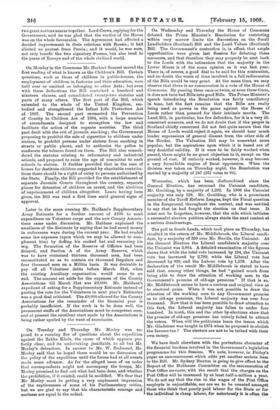On Monday in the Commons Mr. Herbert Samuel moved the
first reading of what is known as the Children's BilL Certain questions, such as those of children in public-houses, the employment of children in factories and their education, were held over or omitted as belonging to other Acts ; but even with these deductions the Bill contained a hundred and nineteen clauses, and consolidated twenty-two statutes and parts of many others. The first part of the Bill, which extended to the whole of the United Kingdom, em- bodied and strengthened the Infant Life Protection Act of 1897. The second part re-enacted the Prevention of Cruelty to Children Act of 1894, with a large number of amendments designed to strengthen the law and facilitate the action of the cognate societies. The third part dealt with the evil of juvenile smoking; the Government proposing to prohibit the sale of cigarettes to children under sixteen, to prohibit persons under sixteen from smoking in streets or public places, and to authorise the police to confiscate the tobacco found on them. The Bill also consoli- dated the statutes relating to reformatory and industrial schools, and proposed to raise the age of committal to such schools to sixteen. It further provided that in the case of homes for destitute children supported by charitable contribu- tions there should be a right of entry to persons authorised by the State. Finally, the Bill provided for the establishment of separate Juvenile Courts throughout the country, separate places for detention of children on arrest, and the abolition of imprisonment of children altogether. Leave having been given, the Bill was read a first time amid general signs of approvaL




































 Previous page
Previous page